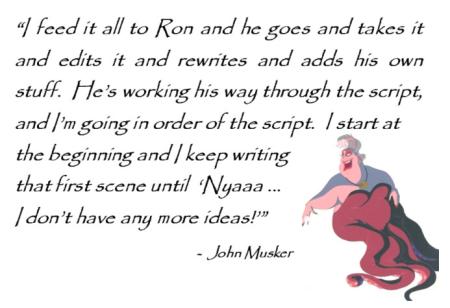Rhett Wickham: Great Animated Performances: Profiles of Modern Masters
Page 2 of 7
RW
Is that how you’ve always worked? Is that how you started working back with MERMAID?
JM
Pretty much.

RW
I still look at THE LITTLE MERMAID as near next to flawless, structurally. In live action or animation it’s as close to perfect as anything I’ve ever watched. I’m always impressed at how it hit’s every beat so perfectly, how it buttons down all the moments and it’s like a model to me.
JM
Well on MERMAID, again, there was sort of an early visual development that Ron and Bruce Morris had done before I got on it that helped.
RW
Where is Bruce Morris now? Is he still up at Pixar?
JM
No he’s on CURIOUS GEORGE, he’s head of story on CURIOUS GEORGE over at Universal. So..that’s good.
RW
So what is the process like once it’s determined that outside writers are going to be brought on? Do you interview writers? Do you have the opportunity to read material and decide who you’d like to bring on?
RC
That first happened with ALADDIN, really. With MERMAID people liked the script, Jeffrey liked the script, and once it got on reels it went through…there were some questions, but it didn’t blow up, nothing blew up like a lot of the films have. But ALADDIN did explode once it got up on reels. There was this thing called “Black Friday�? where Jeffrey watched it from beginning to end, no animation really, but some of the voices were in it and…Robin was in it and there was scratch music and … the entire movie actually. Jeffrey saw it and didn’t like what he saw and told us it wasn’t working at all and to start over from scratch.
As painful as this sounds when Clements and Musker describe it, and as clearly painful as it was, this kind of rocky start is not uncommon. Nor, for that matter, was the response from Katzenberg who more and more as time has gone by, both at Disney and at DreamWorks, gained fame for deriding his artists.
Keep in mind, also, that this fateful day for ALADDIN was one year from the time the project had started in development through to this screening. While a year is a long time, it’s fairly early for an animated feature, and in fact that first year is often the most difficult stretch for story. It is possible that sometimes it’s far better to commit 100% to something that ends up wrong than to dither and dawdle on route, or worse, never step off at all. And as awful as it can feel, sometimes only through failure does the successful path become clear. What made this particularly difficult for Clements and Musker was that “Black Friday�? came less than three months before the full animation team was slated to ramp on to the production and start work. If story wasn’t ready then there were going to be a lot of people with nothing to do.
In the end, the directors found that the pressure and adrenaline were a good thing for the film. Production on ALADDIN was one of the shortest in the history of the studio – from inception to creation to release just over three years. After “Black Friday�? Ron and John interviewed a number of writers; some teams, some individuals, but in the end they decided that Ted Elliott and Terry Rossio were the best fit. They had the right approach, a genuine love for animation, and could easily and happily fit in with the story team and their way of working. Musker and Clements give Rossio and Elliott a great deal of credit for helping the film to find its center.
RW
Do you think the experience made you better writers?
JM
I think I learned things from the experience on ALADDIN.
RC
In the sense that anything that doesn’t kill you makes you stronger.
RW
I don’t know…after 40 I think that philosophy loses credibility, don’t you?
RC (laughing)
I think that’s absolutely true, because to go through that now I think would be harder. We at least were younger then.
JM
The saving grace for us on ALADDIN too, a little bit, was that when Jeffrey was beating up on us I sort of felt like “We got MERMAID, and it turned out well, and I don’t care if you’re giving us notes that make us feel like total idiots, we’re not idiots, we did that movie and it turned out well.�?
RW
Well? Please, it turned around the studio and saved an entire industry!
JM
So that made it easer. In some ways, on MERMAID, when at times he would tell us we were total idiots, that in my own way was more painful because I felt like it was harder to defend yourself. So on ALADDIN I was able to put the comment in context.
RC
And we knew that was a technique that Jeffrey had. Not that the movie didn’t have problems, although we did not end up throwing the whole thing out, we brought a lot of it back, although very, very significant changes were made. But Jeffrey’s technique is that there is no middle ground – it’s either “Fantastic, it’s great, it’s the best thing I’ve ever seen!�? or “It’s horrible horrible horrible, it’s (expletive deleted)! it’s (expletive deleted)!�? and no middle ground. That’s deliberate and it’s calculated, and I think the reason for that is that it creates more energy than “Well, it’s pretty good, I guess but maybe it could be better…�?
